- On June 16, Pope Benedict XVI received Beatitude Chrysostomos II, Archbishop of New Justiniana and Cyprus. From the Vatican website, the English translations of Benedict and Chrysostomos II's addresses to each other and their common declaration.
- On June 17, Pope Benedict XVI visited Assisi on the anniversary of the conversion of St. Francis. From the Vatican website, links to translations of all five addresses, along with a photo gallery.
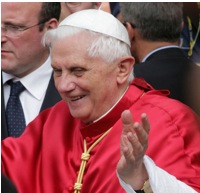 In his homily during the Mass celebrated outside the Basilica of St. Francis, Pope Benedict recalls the interfaith / ecumenical gatherings initiated by his predecessor, and adds his own perspective on the interreligious dialogue:
In his homily during the Mass celebrated outside the Basilica of St. Francis, Pope Benedict recalls the interfaith / ecumenical gatherings initiated by his predecessor, and adds his own perspective on the interreligious dialogue:. . . I cannot forget in today's context the initiative of John Paul II, my Predecessor of holy memory, who in 1986 wanted to gather here at a Prayer Meeting for Peace representatives of the Christian denominations and of the different world religions.
(Via Carl Olson, who also recommends on this subject Fr. Schall's commentary on "The Spirit of Assisi: On Praying With Other Religions" (Ignatius Insight October 16, 2006).It was a prophetic intuition and a moment of grace, as I said a few months ago in my Letter to the Bishop of this Town on the occasion of the 20th anniversary of that event. The choice of celebrating the meeting at Assisi was prompted precisely by the witness of Francis as a man of peace to whom so many people, even from other cultural and religious positions, look with sympathy.
At the same time, the light of the "Poverello" on that initiative was a guarantee of Christian authenticity, since his life and message are so visibly based on Christ's choice to reject a priori any temptation of religious indifferentism which would have nothing to do with authentic interreligious dialogue.
The "spirit of Assisi", which has continued to spread throughout the world since that event, counters the spirit of violence and the abuse of religion as a pretext for violence. Assisi tells us that faithfulness to one's own religious conviction, and especially faithfulness to the Crucified and Risen Christ, is not expressed in violence and intolerance but in sincere respect for the other, in dialogue, in a proclamation that appeals to freedom and reason and in the commitment to peace and reconciliation.
The failure to combine acceptance, dialogue and respect for all with the certainty of faith which every Christian, like the Saint of Assisi, is bound to foster, proclaiming Christ as the Way, the Truth and the Life of man (cf. Jn 14: 6), the one Saviour of the World, can be neither an evangelical nor a Franciscan attitude.
- On June 24, Pope Benedict gave the closing address to participants of the European Meeting of University Professors in Rome. Touching on themes from his Regensburg address, he pointed to several issues worthy of reflection: 1) "the need for a comprehensive study of the crisis of modernity" - countering the "false dichotomy" between theism and authentic humanism, divine law and human freedom. "The anthropocentrism which characterizes modernity can never be detached from an acknowledgment of the full truth about man, which includes his transcendent vocation"; 2) "the broadening of our understanding of rationality" - beyond the confinement of the "purely empirical," fostering a cooperation between faith and reason; 3) the contributions of Christianity to humanism -- "The question of man, and thus of modernity, challenges the Church to devise effective ways of proclaiming to contemporary culture the 'realism' of her faith in the saving work of Christ":
Knowledge can never be limited to the purely intellectual realm; it also includes a renewed ability to look at things in a way free of prejudices and preconceptions, and to allow ourselves to be "amazed" by reality, whose truth can be discovered by uniting understanding with love. Only the God who has a human face, revealed in Jesus Christ, can prevent us from truncating reality at the very moment when it demands ever new and more complex levels of understanding. The Church is conscious of her responsibility to offer this contribution to contemporary culture.
Some amazing photography of Benedict's visit to Assisi, taken by Benodette @ The Benedict Forum. - In June, Pope Benedict also visited the Vatican Library and Secret Archives, reminding the employees of their vocation:
The Pontiff told the staff that on his 70th birthday, he asked Pope John Paul II for permission to "dedicate myself to study and research the interesting documents and finds you safeguard so carefully, real masterpieces that help us to follow the story of humanity and of Christianity."
Here is the full text of Benedict's address to the staff of the Vatican Library."In his providential designs, the Lord had other plans for me," Benedict XVI said, "and here I am today among you not as a passionate student of ancient texts, but as a pastor called to encourage the faithful to work together for the salvation of the world, each one carrying out God's will where he has placed them."
At the end of his visit, the Pope exhorted the staff to consider their work "as a true mission to be carried out with passion and patience, gentleness and in the spirit of faith […] aware that the Gospel message is passed on through your coherent Christian testimony."
According to Zenit, The Vatican Library was founded in 1450 by Pope Nicholas V and houses 1,600,000 ancient and modern books; 8,300 printed documents, including 65 parchments; 150,000 manuscript codes and archive papers; 300,000 coins and medals; and some 20,000 works of art.
- Benedict XVI has re-established that a two-thirds majority will always be required for the election of a Pope. The Holy Father decreed the norm in a June 11 "motu proprio" written in Latin. It was published today by L'Osservatore Romano and is effective immediately. (Zenit News June 26, 2007).
- On June 28, speaking at vespers celebration held at the Basilica of St. Paul Outside the Walls, Pope Benedict celebrated the Solemnity of Saints Peter & Paul:
[F]rom the outset, Christian tradition has considered Peter and Paul to have been inseparable, even if each had a different mission to accomplish.
and dedicated the Jubilee year of June 2008-June 2009 to Paul the Apostle in celebration of the 2,000th anniversary of the saint's birth. From Zenit, here is Father Sassi, superior general of the Society of St. Paul, on the question: "What would St. Paul do if he were alive today?"Peter professed his faith in Christ first; Paul obtained as a gift the ability to deepen its riches. Peter founded the first community of Christians who came from the Chosen People; Paul became the Apostle to the Gentiles. With different charisms they worked for one and the same cause: the building of Christ's Church.
- July 7th, Pope Benedict issued the long-anticipated motu proprio Summorum Pontificum, announcing new norms that will allow the Roman Missal promulgated by Pope John XXIII in 1962 to be used as an extraordinary form of the liturgical celebration. In an interview with Zenit, the Wanderer's Father John Zuhlsdorf provides an analysis of the document and its implications.
A further list of recommended resources and links to discussion can be found here; for ongoing chronicles of the reaction to the document, see SummorumPontificum.net.
- On July 15th, Pope Benedict expressed his gratitude to God (and his hosts) for being able to enjoy the mountains of Northern Italy, where he vacationed until the 21st. Father Federico Lombardi, director of the Vatican press office, confirmed that Benedict XVI was chiefly occupied with working on the second volume of Jesus of Nazareth.
At a July 18 press conference, Cardinal Tarcisio Bertone elaborated on the Pope's vacation habits:
"The Pope is playing the piano a lot but he is also working. He has a great capacity to write a lot. He is writing the second part of his book, 'Jesus of Nazareth,' and a new encyclical with a social theme -- I don't know when it will be published -- and other things.
"He is a volcano of creativity. He is working on things like the message for World Youth Day 2008 and other things 'in pectore.' And he is drawing out and elaborating further themes he has already written about."
And in the Italian daily Il Giornale, Benedict's secretary Msgr. George Ganswein decribed the glowing reception given to the Pope by the residents of the Veneto region:
The Holy Father, "was surprised, even overwhelmed" by "so much affection, kindness and love," from the people he encountered on his vacation, but "he has learned this affectionate language very well," Monsignor Georg Gänswein told the Italian daily Il Giornale.
"At the beginning, I have shared this observation," Monsignor Gänswein said. "Afterward, I have been able to see how the Pope has learned this affectionate language very well, responding with simple and humble, but very eloquent, gestures.
"And the people immediately realize that the Pope is not looking for applause and does not want to call attention to himself, but instead, only wants to guide the faithful to Christ. This is the authentic objective of the Pope's reactions. And the hearts of the people have understood this very well."
- Benedict devoted his July 22 Angelus to the spectre of war, issuing a renewed plea for peace among nations:
If men lived in peace with God and with each other, the earth would truly resemble a "paradise." Unfortunately, sin ruined this divine project, generating divisions and bringing death into the world. This is why men cede to the temptations of the evil one and make war against each other. The result is that in this stupendous "garden" that is the world, there open up circles of hell.
Benedict recalled the letter of his predecessor, Benedict XV's "Nota Alle Potenze Belligeranti" (Note to the Warring Powers), calling for an end to the "useless bloodbath" of the First World War.War, with the mourning and destruction it brings, has always been rightly considered a calamity that contrasts with God's plan. He created everything for existence and, in particular, wants to make a family of the human race. . . .
Benedict XV's "Nota" did not limit itself to condemning war; it indicated, at a juridical level, the ways to construct an equitable and durable peace: the moral force of law, balanced and regulated disarmament, arbitration in disputes, freedom on the seas, the reciprocal remission of war debts, the restitution of occupied territories, fair negotiations to resolve problems.
The Holy See's proposal was oriented toward the future of Europe and of the world, according to a project that was Christian in inspiration but able to be shared by all because it was founded on the law of nations. It is the same program that the Servants of God Paul VI and John Paul II followed in their memorable speeches at the United Nations, repeating in the name of the Church: "No more war!"
- On July 24, 2007, Pope Benedict took part in another question-and-answer session with priests from the dioceses of Belluno-Feltre and Treviso, Italy.
The questions were on topics including the education and Catholic formation of youth, the priest shortage, divorce and remarriage, immigration into Europe, evangelism, burdens facing priests and educators, sports, and the Vatican II Council.
The Vatican has the English translation of the exchanges. Teresa Polk (Blog by the Sea) links to some earlier translations from the PapaRatzinger Forum. The tenth question was made the subject of a column by Sandro Magister: All Against All: The Postconciliar Period Recounted by Ratzinger, Theologian and Pope, responding to a priest who expressed his disappointment that so many hopes and dreams by those who participated in the Second Vatican Council had been dashed.
In Other News . . .
- Benedict XVI is moving the Church away from religion, in the modern sense of the term, and toward a deeper understanding of Christianity, according to Augustinian scholar John Peter Kenney, professor of Religious Studies at St. Michael's College, in Vermont. Zenit interviewed Kenney on the Augustinian influences in Benedict's pontificate (Zenit News, June 19, 2007):
Religion is a category of modernity, usually understood to mean either individually authenticated spiritual experiences or else a particular type of collective ideology based on socially defined values.
To think of Christianity in such terms is to drift toward the relativism that Pope Benedict has so famously decried. Hence Benedict XVI has insisted that personal spiritual experiences can only become meaningful within the shared context of a lived theology. And the collective life of the Church is far more than a form of social or political association. Christianity is not an ideology.
These modern representations of religion can constitute a reduction of Christianity to psychological, sociological and political categories and can result in a denial of its claims to transcendent truth.
Benedict XVI has a masterful grasp of all these reductionist tendencies and he has pushed back hard in order to restore recognition of the richness and depth of Christianity.
Zenit interviews Father Twomey, retired professor of moral theology at the Pontifical University of St. Patrick's College, in Maynooth, and author of Pope Benedict XVI: The Conscience of Our Age: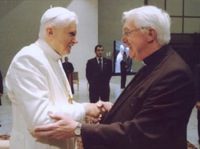
Dr D. Vincent Twomey, SVD, congratulates his former doctoral supervisor on his election to the papacy. Courtesy: FotografiafeliciQ: What do you think are the most defining characteristics of the writings of Joseph Ratzinger, now Benedict XVI?
Twomey also addressed Ratzinger's "courage to be imperfect," as indicated by the unfinished state of his published works:Father Twomey: The most defining formal characteristics of his writings are originality, clarity and a superb literary style that is not easy to render in translation.
Ratzinger is more than a world-class scholar and academic: He is an original thinker.
He has the Midas touch, in the positive sense that whatever he touches, he turns to gold, in other words, whatever subject he examines, he has something new and exciting to say about it, be it the dogmas of the Church or a mosaic in an ancient Roman church or bioethics. And he writes with amazing clarity.
With regard to his style, Cardinal Joachim Meisner of Cologne is reported as commenting that Ratzinger is the Mozart of theology -- he writes masterpieces effortlessly.
With regard to its content, as Ratzinger once said himself, "God is the real central theme of my endeavors."
There is hardly an area of theology -- dogma, moral, political life, bioethics, liturgy, exegesis, music, art -- that he has not examined in-depth. And everything he examines, he does so from God's viewpoint, as it were, namely trying to discover what light revelation -- Scripture and Tradition -- can shine on a particular issue.
Basic to his whole attitude to life and to theology is the assumption that only God is perfect, that human effort is always imperfect. . . .
On Father Twomey's long friendship with and appreciation of the Holy Father, see also:We cannot know everything, least of all God and his design for man. I have described his writings as "fragmentary." Most of his writings are unfinished -- like his classic book, "Introduction to Christianity," and, more recently, his "Jesus of Nazareth." And yet he has the courage to publish them in their unfinished state.
This attitude gave Joseph Ratzinger that inner calm and detachment which the world is now experiencing in Benedict XVI. But it also is, perhaps, the secret of his gentle humor and wit.
- The Courage to be Imperfect The Word May 30, 2005.
- The Theological Genius of Joseph Ratzinger | An Interview with Fr. D. Vincent Twomey Carl Olson, Ignatius Insight
- Blast from the past: Fr. Twomey wrote a pretty critical review of John Allen Jr.'s The Vatican Enforcer in the October 2001 Homiletic & Pastoral Review, taking Allen to task for being tendentious, uncritical, and altogether too favorable to hostile witnesses (like Hans Kung). Following the election of Benedict XVI, Allen made something of a turnaround -- even going so far as to "recant", accepting another priest's criticism of his biography.
- For Benedict, environmental movement promises recovery of natural law tradition, by John Allen, Jr. Daily Journal, National Catholic Reporter July 27, 2007:
One could say that summer 2007 is when the Vatican decided to go green. First came an announcement in June that more than 1,000 photovoltaic panels will be installed atop the Paul VI Audience Hall, allowing the building to utilize solar energy for light, heating and cooling. A month later, the Vatican became the first state in Europe to go completely carbon-neutral, signing an agreement with a Hungarian firm to reforest a sufficiently large swath of Hungary's Bükk National Park to offset its annual CO2 emissions.
To some, these may seem curiously cutting edge moves from a pope whose recent decisions to revive the pre-Vatican II Mass and to reaffirm claims that Catholicism is the lone true church have cemented his reputation as the ultimate "retro" figure. He sometimes brings to mind the famous quip that rolling back the clock is a perfectly reasonable thing to do if it's keeping bad time.
So what gives?
- Benedict’s Gifts and ‘Gaffes’ National Catholic Register August 12-18, 2007 Issue:
The media is a double-edged sword: It can lift you up, and it can knock you down. Last year, headlines and commentators expressed surprise at the gifts the pontificate of Pope Benedict XVI had brought to the Church. Now, their praise has been replaced by finger-pointing at the “gaffes” of the same Holy Father.
The problem: There’s not that much difference between those gifts and those gaffes. . . .
- Benedict's Jesus of Nazareth is one of the best-selling books in France. In the current list published by the magazine L'Express, the book is at No. 5. It was released on June 7 and has remained on the bestsellerlist for 7 weeks.
- "Miracles are very hard to come by in Britain" - or so says Pope Benedict, to English prime minister Tony Blair during their meeting this past June. American Papist has the details.
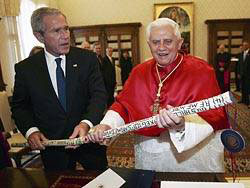 Gift or Gaffe?: Why Bush Gave Benedict a Walking Stick, by Wayne Laugesen. National Catholic Register June 24-30, 2007 Issue -- on the carved walking stick that President Bush presented the Pope on the occasion of his first visit, inscribed with the Ten Commandments. The gift was regarded as a laughingstock by liberal critics; the Register tells a different story:
Gift or Gaffe?: Why Bush Gave Benedict a Walking Stick, by Wayne Laugesen. National Catholic Register June 24-30, 2007 Issue -- on the carved walking stick that President Bush presented the Pope on the occasion of his first visit, inscribed with the Ten Commandments. The gift was regarded as a laughingstock by liberal critics; the Register tells a different story:The stick was designed and carved by Roosevelt Wilkerson, a man who lived on the streets of Dallas with his wife until Susan Nowlin, a good friend of George and Laura Bush, discovered his craft and began helping him sell the carvings, known as Moses Sticks. [...]
The Register reports that the Holy Father did not appear at all phased by the President's gift of a walking stick, nor is down-home Texan manner of referring to him as "Sir." Neither should we, I suppose.The first stick Nowlin bought was given to her pastor. Subsequently, she gave a stick to then-Gov. Bush because she knew he cared about the homeless and the poor — and the Ten Commandments. Greeting Nowlin for a luncheon at the governor’s mansion, Laura Bush told her that Gov. Bush considered his Moses Stick “the greatest gift ever.” [...]
In preparing for the Vatican visit, Bush contacted Nowlin about acquiring a stick so the White House protocol office could review it as a possible gift for Pope Benedict XVI. Wilkerson and his wife haven’t been homeless for most of the past 10 years because of the Moses Sticks, but Nowlin says it hasn’t been easy. Sometimes, sales have been slow.
“I needed to sell at least seven sticks a month, if they were to stay off the street,” Nowlin said. “When orders were slow, Roosevelt and I would pray. We would just pray and pray and pray and the orders would come in.”
As a result of the president’s gift to the Pope, Nowlin said she and Wilkerson can’t keep up. She has raised the price of the sticks to $100, but says she could probably charge $1,000 or more and still have a backlog of orders.
- The Ratzinger Effect: more money, more pilgrims – and lots more Latin July 7, 2007:
Cardinal Sergio Sebastiani, head of economic affairs at the Holy See, said that the “remarkable increase” in both donations and numbers of pilgrims showed that there was “a symbiosis, a mutual sympathy between this Pope and Christian people everywhere”.
Presenting the Holy See’s annual budget yesterday, Cardinal Sebastiani noted that not only had it closed last year with a surplus of €2.4 million, partly thanks to diocesan donations, there had also been a “huge jump” in “Peter’s Pence”, the annual church collections given directly to the Pope to use for charity, from $60 million (£30 million) in 2005 to $102 million. “The days when people talked of papal bankruptcy are past,” said Marco Tosatti, Vatican correspondent of La Stampa. . . .
Record numbers attend Benedict’s weekly audiences, and seven million people a year now visit St Peter’s, a rise of 20 per cent. Similar increases are recorded for pilgrimages to Catholic shrines at Assisi, Lourdes, Fatima in Portugal and Madonna di Guadalupe in Mexico. “This is a Ratzinger phenomenon,” reported La Repubblica.
- Bonaventure & Benedict July 15, 2007. dotCommonweal [blog]:
Today, tucked into the celebration of "the weekly Easter," the Dies Domini, the Church also commemorates, with the entire Franciscan family, St. Bonaventure, theologian and pastor.
In 1959 the young professor, Joseph Ratzinger, published a significant study: The Theology of History in St. Bonaventure. This second thesis, or Habilitationschrift, is required for the aspirant to hold a chair in a German university.
In his 1969 "Foreword to the American Edition," Ratzinger writes of his findings . . . READ MORE
- "A Day in the Life of the Pope" - stills from a documentary, with shots from inside the rather modest Papal apartment, study and chapel. (Courtesy of the The Pope Benedict XVI Forum).
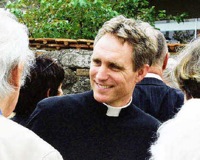 Interview with Msgr. Georg Gaenswein Sueddeutsche Zeitung July 26, 2007 (kindly translated from German by Gerald Augustinus of Closed Cafeteria ). The interviewer, Peter Seewald, is the co-author of several book-length interviews with Cardinal Ratzinger - Salt of the Earth and God and the World. On the state of the Pope's health:
Interview with Msgr. Georg Gaenswein Sueddeutsche Zeitung July 26, 2007 (kindly translated from German by Gerald Augustinus of Closed Cafeteria ). The interviewer, Peter Seewald, is the co-author of several book-length interviews with Cardinal Ratzinger - Salt of the Earth and God and the World. On the state of the Pope's health:PS: When he was a cardinal, Joseph Ratzinger wanted to retire, stating he was exhausted.
On his own service to the Holy Father:MG: With his election as Pope something happened that he neither strived for nor wanted. But I am convinced that, as he by and by surrendered to God's will, the grace of the office in his person and his actions has shown effect and still is. . . .
PS: The son of a blacksmith from a 450 people village in the Black Forest who now travels with the Holy Father in a helicopter and shares the concerns of the global Church (Weltkirche) - does one ask oneself: Why me? What does God want from me?
On the unfortunate caricatures of him by the tabloids and the ogling of adoring fans:MG: I asked myself this very question, and not just once. It is a task that you cannot plan. In promising the Holy Father fidelity and obedience, I tried to answer that question. In that, I see a message from God, to face this task without reservations.
PS: You're probably the first Papal secretary in history that's also in the spotlight next to the Pontifex: People Magazine swoons over the "Sunnyboy in the cassock", the Swiss Weltwoche calls you the "most handsome man in a soutane". Donatella Versace dedicated a fashion line to you. Does this image as a "ladykiller" (ie someone who looks like one) bother you ?
It's a lengthy (and, as it progresses, substantial) interview, so read on.MG: It didn't make me blush, but it irritated me a bit. It doesn't hurt and it was flattering, and it's no sin. I'd never been confronted like this with my "shell". Then I noticed that it was largely an expression of sympathy - a bonus, not a malus; I can handle that well. But, I don't want that people don't just look at me but also acknowledge the substance.
Also, from Benodette @ Benedict Forum, translation of another interview with Msgr. Ganswein in Suedkurier.de:
. . . [Jesus of Nazareth] is enjoying a great success in Germany too. Have you read it already?
Yes, for the second time. It is a spiritual legacy of a man who has grappled with Jesus throughout his whole life as a priest, as a professor, as archbishop and Cardinal Prefect, and now as Pope. He draws upon the sum of his life, and sets down a confession [of faith]. Readers will be much encouraged and strengthened in their faith by this book.
The Regensburg speech was the speech with the greatest worldwide echo. Some Muslims reacted indignantly. Since this experience do you look at the papal speeches beforehand?
Naturally, the Pope takes reactions to his speeches into account, and ponders, separates the wheat from the chaff. But he doesn’t let himself be hemmed in, because someone doesn’t agree with this or that statement or heavily criticizes it. Many who remain silent, who do not announce themselves with public bluster, are grateful for his clear, trailblazing words.
Are other departments of the Catholic Curia involved with papal pronouncements?
The Pope usually writes speeches, homilies and lengthy texts himself. When necessary, individual components are provided or suggestions are compiled. But he is the architect of the text. . . .
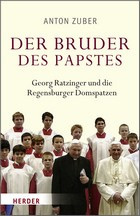 From the Benedict Forum, news of a German biography of Benedict's brother, Georg Ratzinger:
From the Benedict Forum, news of a German biography of Benedict's brother, Georg Ratzinger:A biography of Monsignor Georg Ratzinger is to be published later this month by Herder-Verlag. The author is 56 year old journalist Anton Zuber who lives near Heilbronn.
Oberpfalznetz -The Pope will be given the book by his brother on 16 August at Castelgandolfo. It will be generally available on 25 August. The book is titles Georg Ratzinger and the Regensburg Domspatzen. The book will concentrate on Georg Ratzinger’s life as a musician. The book has 256 pages and will be sold at 19.90 Euro.
From the German wires:
German news wires - People have always had an interest in those who are close to a Pope. Stanislaw Dziwisz, now Cardinal Archbishop of Krakow, has published a book about his years with Pope John Paul II which reveals something of how close their relationship was.
Never before, however, has a book been dedicated to the life of a Pope’s brother. Today, at Castelgandolfo, Monsignor Georg Ratzinger presented the first copy of his biography to his bother the Pope. Written by the journalist Anton Zuber, and published by Herder, the book is focused on his years as Master of the Regensburg Domspatzen, which achieved world-wide celebrity under his leadership between 1964 and 1994.
Anton Zuber spent many hours in conversation with Georg Ratzinger for the biography. The book also covers Monsignor Ratzinger’s shocked reaction to the result of the conclave, his childhood and youth, his career as a musician, his time in the war (he was wounded in Italy), his captivity as a POW, his ordination and his first Mass. He also speaks of his small brother, with whom he and his sister Maria would play, their respect for their industrious mother and firm but fair father. He recalled the tale of his brother’s tears over a teddy bear which disappeared from the shop window across the street, only to turn up under their Christmas tree.
- Pope set to declare income tax evasion 'socially unjust', by Richard Owen. Times [UK] August 11, 2007:
Pope Benedict XVI is working on a doctrinal pronouncement that will condemn tax evasion as “socially unjust”, according to Vatican sources.
Adds Rick Garnett (Mirror of Justice): "I hope this document attends carefully to the non-trivial challenge of defining 'tax evasion.'" At this point, we can only speculate.In his second encyclical – the most authoritative statement a pope can issue – the pontiff will denounce the use of “tax havens” and offshore bank accounts by wealthy individuals, since this reduces tax revenues for the benefit of society as a whole.
It will focus on humanity’s social and economic problems in an era of globalisation. Pope Benedict intends to argue for a world trade and economic system “regulated in such a way as to avoid further injustice and discrimination”, Ignazio Ingrao, a Vatican watcher, said yesterday.
The encyclical, drafted during his recent holiday in the mountains of northern Italy, takes its cue from Pope Paul VI’s encyclical Populorum Progressio (On the Development of Peoples), issued 40 years ago. In it the pontiff focused on “those peoples who are striving to escape from hunger, misery, endemic diseases and ignorance and are looking for a wider share in the benefits of civilisation”. He called on the West to promote an equitable world economic system based on social justice rather than profit.
On a Lighter Note . . .
- For the Papist Who Has Everything . . .. A Bobble-Head Benedict. It has to be seen to be believed.
- Pope Outed as Catholic (Parody is Therapy July 13, 2007):
A Vatican document published with the Pope's blessing has created a firestorm of controversy and has outed the Pope as a believing Catholic.
Apparently he thinks the Catholic Church is the true Church and considers the sacraments real and are what they signify.
- Papist Picture of the Day @ American Papist: "Little did Timmy know, but his most memorable night of working at the McDonald's drive-through window was about to begin!"
- Finally, congratulations to The American Papist for his recognition as a resource on Benedict XVI by the New York Times. (The Benedict Blog / Benedict XVI Fan Club was selected as well):
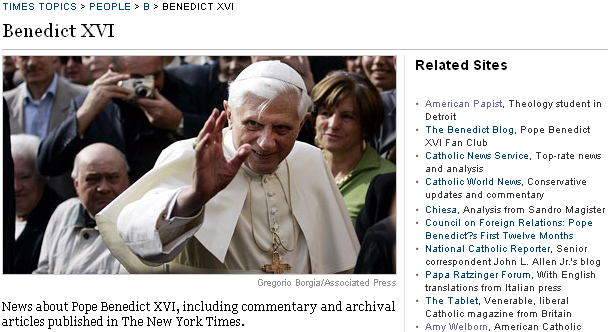

No comments:
Post a Comment